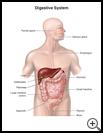
Gastritis
________________________________________________________________________
KEY POINTS
- Gastritis is inflammation of the lining of the stomach, which means it is irritated, raw, and often painful.
- You may feel better without treatment or by changing what you have been eating and drinking. Your healthcare provider may prescribe antibiotic medicine, or medicine to lower your stomach acid level or to protect your stomach lining.
- Long-term gastritis increases the risk of stomach ulcers and stomach cancer. Be sure to let your provider know if your symptoms are not getting better and especially if they are getting worse.
________________________________________________________________________
What is gastritis?
Gastritis is inflammation of the lining of the stomach. Inflammation means your stomach lining is irritated, raw, and painful.
What is the cause?
Gastritis can happen when your stomach lining is injured or infected. Some common causes are:
- Taking nonsteroidal anti-inflammatory drugs (NSAIDS), such as aspirin, ibuprofen, naproxen, or ketoprofen
- Infection with the H. pylori bacteria
- Taking steroid medicines, such as prednisone
- Drinking too much alcohol
- Stress from accidents or injuries, such as being in a car wreck, having a bad infection, or having a severe burn
- Some medical conditions, such as Crohn’s disease
What are the symptoms?
The symptoms of gastritis are different from person to person and depend on the cause. Common symptoms are:
- A sharp or burning pain in your stomach
- Loss of appetite
- Nausea or vomiting
At its worst, gastritis can cause the lining of your stomach to bleed, which may cause you to throw up bloody or dark brown fluid. The dark fluid, which is partially digested blood, looks like it has coffee grounds in it. If the blood moves through your stomach and into your intestines, you may have bowel movements that are bloody or black and tarry looking. If you have these symptoms, call your healthcare provider right away.
How is it diagnosed?
Your healthcare provider will ask about your symptoms and medical history and examine you. Tests may include:
- Blood tests
- A test to look for H. pylori
- A sample of your bowel movement to test for blood
- Endoscopy, which uses a slim, flexible, lighted tube passed through your mouth to look at your esophagus and stomach. A biopsy may be taken to help make a diagnosis. A biopsy is the removal of a small sample of tissue for testing.
- Gastric lavage, which involves putting a tube into your stomach to look for bleeding or to remove fluid for testing
How is it treated?
The treatment depends on the cause of the gastritis and how severe it is. If your symptoms are caused by something you have been eating or drinking, your symptoms may last just a few days and get better without any treatment.
Possible treatments are:
- Antibiotics to treat H. pylori
- Medicine to lower the acid level in your stomach
- Medicine that coats and protects the lining in your stomach and intestine from acid
How can I take care of myself?
- Take your medicines exactly as prescribed.
- Follow the diet prescribed by your healthcare provider. Avoid any food or drink that seems to bother your stomach, such as spicy foods, acidic foods like oranges or tomatoes, and tea, coffee, and cola. Eat only bland foods, such as soda crackers, toast, plain pasta, noodles, bananas, baked or broiled potatoes, and clear liquids until your symptoms stop.
- Keep track of what you ate right before your symptoms started. Avoid foods that seem to cause symptoms.
- Don’t use alcohol. It irritates the stomach.
- Avoid cigarettes and chewing tobacco because they slow the body’s healing. If you smoke or chew, try to quit. Talk to your healthcare provider about ways to quit smoking.
- Ask your provider if you can take nonsteroidal anti-inflammatory drugs (NSAIDs), such as aspirin, ibuprofen, and naproxen. Your provider may want you to use acetaminophen for pain relief instead. If your provider says it’s OK to take NSAIDs, try taking them with food to help avoid irritating your stomach.
- A healthy lifestyle may also help:
- Try to get at least 7 to 9 hours of sleep each night.
- Stay fit with the right kind of exercise for you as recommended by your healthcare provider.
- Try to keep a healthy weight. If you are overweight, lose weight.
- Learn ways to manage stress. Ask for help at home and work when the load is too great to handle. Find ways to relax. For example, take up a hobby, listen to music, watch movies, or take walks. Try deep breathing exercises when you feel stressed.
- Long-term gastritis increases the risk of stomach ulcers and stomach cancer. Be sure to let your provider know if your symptoms are not getting better and especially if they are getting worse.
- Ask your healthcare provider:
- How and when you will get your test results
- How long it will take to recover
- If there are activities you should avoid and when you can return to your normal activities
- How to take care of yourself at home
- What symptoms or problems you should watch for and what to do if you have them
- Make sure you know when you should come back for a checkup. Keep all appointments for provider visits or tests.
How can I help prevent gastritis?
Some things you can do that might help prevent gastritis are:
- If you find that aspirin or other NSAIDs cause you to get gastritis, use a different medicine. If your healthcare provider has prescribed aspirin for you, be sure to ask about stopping the aspirin. You may need to change the dose, use a coated aspirin, or take a different medicine.
- Avoid drinking alcohol or ask your healthcare provider what is a safe amount of alcohol for you to drink.

